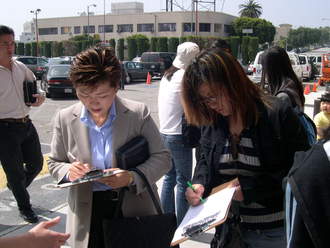
In Utah, state law makes it just difficult enough that few citizen initiatives make it onto the ballot unless, arguably, they are worthy of consideration.
That may be about to change, however, at least when it comes to local governments — and not in a good way.
| | By definition, a ballot initiative is a challenge to the power of elected officials. But it also challenges people who might benefit from those decisions. If SB66 makes it into law, local governments will be a little more insulated from that unpleasantness. First, some recent history: Two of the more publicized measures that made it onto local ballots last year were hardly liberal in nature. They were expressions of two values that define the state — religious principle and fiscal prudence. One, in Highland, sought to overturn a City Council decision to allow retail sales on Sundays. It passed decisively. The other, in Orem, sought to overturn a 25 percent hike in property taxes. The referendum collected enough signatures and will appear on ballots this fall. The tax hike, meanwhile, has been put on hold pending the vote. This community muscle-flexing apparently was too much. If SB66 becomes law, people petitioning to overthrow a newly passed local ordinance wouldn’t just have to collect a certain amount of signatures. They would have to collect them from each separate voting precinct in that community at a level matching a percentage of the number of people who voted in the most recent presidential election. The actual percentage was being amended as I wrote this. The sponsor, Sen. Stuart Reid, R-Ogden, explained to me this is to ensure that the measure represents the feelings of a wide cross-section of the community, not just the special interest of a few. If organizers pass that test, the local government would be required to calculate the fiscal and legal impact of the initiative and include that in the voter information pamphlet people use to make their decisions. Highland voters, in other words, would have been given an estimate as to what their devotion to principle was costing everyone. Likewise in Orem, although there the city is being forced to operate without its tax increase until the fall, so the costs are apparent to all. None of this should be a surprise. SB66 is the latest in a battle that dates back more than a century. When the populist movement began to take root at the end of the 19th century, Utah was only the second state to adopt the power of citizen initiatives and referenda. It did so in 1900 by an overwhelming vote of the people. However, it took lawmakers 16 years to pass a law that enabled initiatives, and they did so in a way that made the new right useless. People could sign petitions only in the presence of someone authorized to administer oaths, such as a judge. In the long history since then, the state Supreme Court has forced changes that gave people more power, but the tug-of-war is never-ending. As I’ve noted before, this isn’t an easy issue. The nation’s founders didn’t like the idea of direct democracy. The public can be manipulated by narrow interests, as Reid said. And yet initiatives are attractive ways to force the will of the people when lawmakers clearly have other interests. The rules ought to be strict enough to keep Utah from becoming California, but loose enough to allow people to check abuses. They already are. Supporters of SB66 can’t seem to identify a problem that needs fixing, unless it is simply that a community’s religious conviction or fiscal conservatism should not be imposed on reluctant politicians. |

 RSS Feed
RSS Feed

